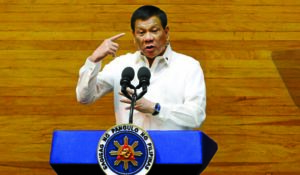It wouldn’t be wrong to say that Malacañang is a firm believer in surveys as an accurate and timely gauge of the public pulse.
Last July, in the wake of a Social Weather Stations survey showing President Duterte with a net satisfaction score of +66, his highest rating so far since assuming office, Presidential Spokesperson Ernesto Abella said: “The survey result, three percent higher from March 2017 … is a clear indication of the growing confidence in the Chief Executive and in his performance as the country’s leader.”
A month before then, with another SWS survey showing that 57 percent of adult Filipinos supported the President’s declaration of martial law in Mindanao, Malacañang highlighted the results as validating Mr. Duterte’s hand: “The positive public response indicates that they believe the factual and legal basis of the proclamation of martial law in Mindanao, which includes the Maute group’s attempt to remove allegiance from the government and to deprive the Chief Executive of his powers to enforce the laws and maintain public order and safety.”
In April, there was Abella trying to explain survey results showing a significant 11-point decline in the public’s support for the administration’s centerpiece war on drugs (from a +77 net satisfaction rating to +66, though still within “very good” territory): “We note that the public … believes the current administration is serious about solving the problem of so-called ‘extrajudicial killings,’ and its efforts to cleanse the Philippine National Police.” He also emphasized that a “great majority” of Filipinos are still satisfied with the government’s handling of the drug menace “notwithstanding the negative criticism we received here and abroad.”
As significant, though, as that 11-point decline was another set of numbers that Abella failed to remark on: The SWS survey conducted on March 2017 showing that an overwhelming majority of Filipinos—73 percent—expressed fear or worry that they or their loved ones would end up a victim of extrajudicial killing. An even bigger number—92 percent—said it was important that the police capture drug suspects alive, while only about 70 percent felt that the administration was serious enough in addressing the issue of EJKs.
As to the controversy over the seemingly template stories of suspected drug pushers or users turning up dead in the hands of the police for allegedly resisting arrest—“nanlaban,” as the cops put it—over 31 percent of the respondents thought the police were lying; 24 percent said the police were telling the truth; and 44 percent indicated indecision about the issue.
Still, despite that undercurrent of anxiety among ordinary Filipinos about EJKs and police misconduct, Abella appeared to see a different reality: “Many Filipinos are less worried about their personal safety, as they feel safe and secure in the streets and at home,” he said.
The results of the latest SWS survey offer a grim truth as presented by the numbers: From 31 percent in March, 54 percent of Filipinos now disbelieve the police’s “nanlaban” claims about dead suspects. Those undecided have gone down to 25 percent, while only 20 percent disagreed with the observation. The June 23-26 survey was conducted two months before news on the successive killing of teenagers Kian delos Santos, Carl Arnaiz and Reynaldo de Guzman exploded and led to massive public outrage.
Another ominous finding reported: Half of the respondents also agreed that many are lying about supposed suspects and pointing to their personal enemies as drug users or pushers in order to give an excuse for these people to be killed by police or vigilantes.
The writing is on the wall: The war on drugs has been botched, and more and more people are no longer buying it.


